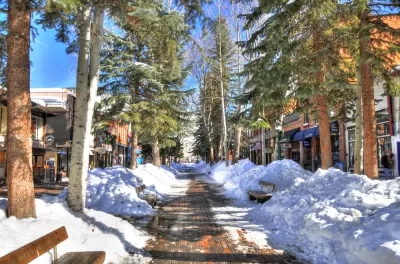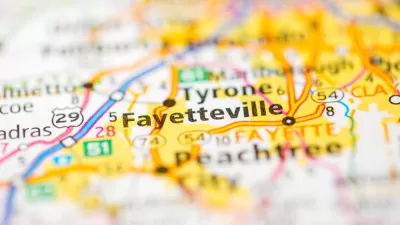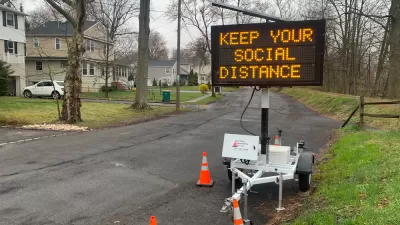Residents and elected officials of the famously wealthy mountain town of Aspen don't like the way the city is headed.

"Aspen’s city council this week stopped issuing not just short-term rental permits, but permits for all home construction as the city struggles with a critical lack of affordable housing and the increasing use of homes by vacationers," reports Jason Blevins.
At the moment of the city council's decision, the city was processing 182 new applications for short-term rental licenses, showing the example of broader trend in rural semi-rural vacation destinations around the United States. The rise of so-called "Zoom Towns" is disrupting life in these locations, exacerbating inequality, making it harder for service industry workers to afford homes near their jobs, and raising the topic of gentrification and displacement in corners of the country that previously had been spared one of the more challenging and contentious debates in contemporary planning.
According to the article, Aspen's the short-term rental and construction moratorium taps into a disconnect between the city's previous and current efforts, and the direction of the market in the city.
With a long-term vision for the city laid out in the 2012 Aspen Area Community Plan, the city is also "years into environmental stewardship missions to reduce Aspen’s waste and emissions." Recently, the council has noted that the industry surrounding residential home development 'poses significant obstacles in making progress on many of these important issues,'" writes Blevin, citing the words of Phillip Supino, Aspen’s director of community development at the conclusion of that last sentence. Supino is also cited to say that the moratorium on new construction won't send prices even higher by restricting new supply. Here's how Blevins explains Supino's line of thought:
The supply and demand for Aspen homes have been decoupled from local economics in Aspen for decades. Working residents are not paying $12 million for their homes. The real estate market in Aspen “no longer delivers meaningful housing for local residents” and “the vast majority” of locals and workers in the city live in deed-restricted, subsidized housing, the ordinance says.
A lot more of the political debate and local conditions are explained in the source article at the link below.
FULL STORY: Aspen suspends new home construction permits as it drops the hammer in the name of affordability

Manufactured Crisis: Losing the Nation’s Largest Source of Unsubsidized Affordable Housing
Manufactured housing communities have long been an affordable housing option for millions of people living in the U.S., but that affordability is disappearing rapidly. How did we get here?

Americans May Be Stuck — But Why?
Americans are moving a lot less than they once did, and that is a problem. While Yoni Applebaum, in his highly-publicized article Stuck, gets the reasons badly wrong, it's still important to ask: why are we moving so much less than before?

Using Old Oil and Gas Wells for Green Energy Storage
Penn State researchers have found that repurposing abandoned oil and gas wells for geothermal-assisted compressed-air energy storage can boost efficiency, reduce environmental risks, and support clean energy and job transitions.

Greening Oakland’s School Grounds
With help from community partners like the Trust for Public Land, Oakland Unified School District is turning barren, asphalt-covered schoolyards into vibrant, green spaces that support outdoor learning, play, and student well-being.

California Governor Suspends CEQA Reviews for Utilities in Fire Areas
Utility restoration efforts in areas affected by the January wildfires in Los Angeles will be exempt from environmental regulations to speed up the rebuilding of essential infrastructure.

Native American Communities Prepare to Lead on Environmental Stewardship
In the face of federal threats to public lands and conservation efforts, indigenous groups continue to model nature-centered conservation efforts.
Urban Design for Planners 1: Software Tools
This six-course series explores essential urban design concepts using open source software and equips planners with the tools they need to participate fully in the urban design process.
Planning for Universal Design
Learn the tools for implementing Universal Design in planning regulations.
Heyer Gruel & Associates PA
City of Moreno Valley
Institute for Housing and Urban Development Studies (IHS)
City of Grandview
Harvard GSD Executive Education
Salt Lake City
NYU Wagner Graduate School of Public Service
City of Cambridge, Maryland





























